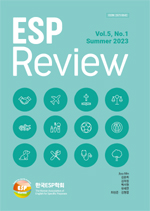Hospitality 직무영어 분야의 ELF 교육을 위한 요구조사
A needs analysis to incorporate ELF-informed education in an EOP program for hospitality service
- 한국ESP학회
- ESP Review
- Vol.5 No.1
-
2023.0659 - 80 (22 pages)
-
DOI : 10.23191/espkor.2023.5.1.59
- 11

This research conducts an initial needs analysis (NA) to integrate English as a Lingua Franca (ELF)-informed instruction into an English for Occupational Purposes (EOP) program in international hotel service. The study begins with the investigator’s ‘perceived needs’ to identify the students’ (future hotel professionals’) ‘felt needs’ (Berwick, 1989) relating to their ELF proficiency. Basturkmen’s (2010) five-point NA, analyzing ‘target situation,’ ‘discourse,’ ‘current situation,’ ‘learner factor,’ and ‘teaching context,’ was applied. A significant finding was the students’ deficiency in ELF proficiency in the host community language, encompassing World Englishes understanding and sociolinguistic variations in the target language scenario. These deficits could provoke varying sociolinguistic reactions and emotional responses such as anxiety or frustration, as seen in previous work experiences. Further, the students’ language behavior and communicative strategies underscore the need to augment the existing EOP program with ELFinformed education, facilitating better ELF practice adoption. The study promotes awarenessraising of different sociolinguistic variations for enhancing intercultural competence. Given these insights, the researcher proposes that an ELF competence model for EOP students should be threefold, comprising receptive and productive skills and communicative strategies.
Ⅰ. 들어가는 말: 연구의 목적
Ⅱ. 연구의 배경
Ⅲ. 연구방법
Ⅳ. 결과 및 논의
Ⅴ. 맺음말
참고문헌
(0)
(0)